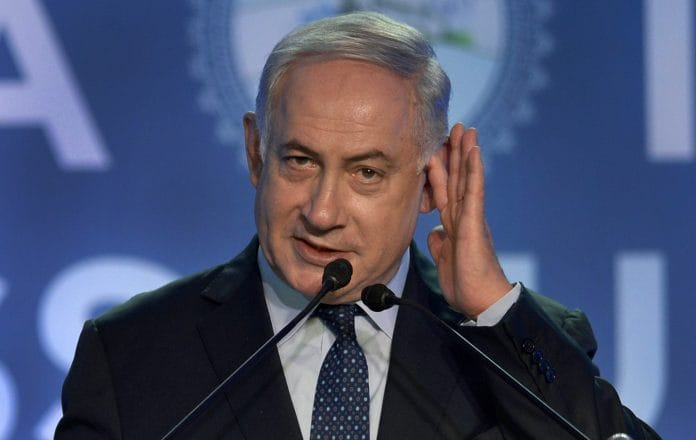Tel Aviv: Criminal charges didn’t do it. Neither did election machinations that kept the country in limbo for over a year, nor policies that divided a nation.
It took lives blighted by a mismanaged coronavirus outbreak to galvanize thousands of Israelis into a drum-beating, horn-blowing, cacophony of protests calling for Benjamin Netanyahu’s head.
The Israeli prime minister, already weakened by corruption indictments, is sinking deeper into trouble, not only with opponents, but loyalists, too. His support is plummeting in polls, and while he’s not expected to resign, the protests have opened another front against him as he struggles to govern with a fractious coalition and thrice-weekly court appearances scheduled to begin in January.
“Netanyahu perceives this political period as a threat to his hold on power,” said Dan Avnon, chair of Hebrew University’s political science department. For him, these demonstrations are “tangible aspects of his sense that he may actually have to let go of the premiership” at some point.
The protests are a freewheeling affair with no common agenda or leadership that have snowballed since late June to include several tens of thousands of people last Saturday. They’re centered down the street from the prime minister’s official residence in Jerusalem and take place as many as four times a week.
They’ve become a catchall of grievances, but the main themes are anger at Netanyahu’s alleged corruption, a sense the country has been hijacked by a political class they see as more protective of its power than focused on tackling the virus outbreak. After early success, Israel is experiencing a second, harsher wave of infections, while unemployment is stuck at 21%.
“This process brought an awakening among young people, because of the extreme weakness of the government in its management,” said Asaf Agmon, 72.
Netanyahu calls the protesters, dominated by a mix of young and older liberals, anarchists and leftists egged on by a media that ignores “wild and unfettered incitement” to murder him and his family. Ahead of the demonstrations, authorities cordon off the area around his residence with barricades, armored vehicles and water cannon that have been trained on protesters who don’t want to disperse once the allotted time is over.
Some of the demonstrators are former Netanyahu supporters who deplore the state the country is now in.
Arnon Grossman, a 57-year-old program manager at a high tech firm, voted for Netanyahu in Israel’s latest elections, but for the past few weeks he’s been driving two hours from his northern village to protest the prime minister’s assumption of broad powers during the pandemic.
“Our state is heading toward the direction of a dictatorship,” Grossman said.
The discontent is pulsing at a time when Israel is being run by an emergency government on the brink of collapse and while Netanyahu, who denies wrongdoing, is preparing to take the stand in his influence-peddling trial. Many signs at the protest accuse the government of being “out of touch” and led by a “crime minister.”
Also read: ‘We’re fed up with you, Bibi’ – Israel’s Covid mess adds to Netanyahu’s mountain of woes
The murder of a peace activist by a grenade-throwing right-winger at a 1983 rally has prompted dark warnings about the current unrest as Netanyahu and his son, Yair, denounce the protests. Yair has called the demonstrators “aliens,” and was ordered by a court to stop harassing some protest activists after he tweeted out their addresses and phone numbers.
Several demonstrators have been assaulted, with one man being stabbed in the neck and slightly wounded. The man who killed the protester at the 1983 rally has called the demonstrators “germs” that should be “eradicated” and said Netanyahu supporters “know what to do.”
As protests mount, polls show overwhelming numbers of Israelis dissatisfied with the government’s handling of the virus emergency. The latest shows Netanyahu’s Likud sinking from its current 36 seats in parliament to 29, and his nationalist-religious bloc sinking below a 61-seat majority for the first time in months.
Even so, Likud remains by far the biggest party, with no serious challenger after the Blue and White party led by Defense Minister Benny Gantz fractured over his decision to team up with Netanyahu in government. Three months later, the coalition is verging on collapse, and talk of a fourth vote is rife.
The fallout is “dramatic from the point of view of Netanyahu,” said pollster and Tel Aviv University statistician Camil Fuchs. “But you don’t see that it’s going to topple Netanyahu.”
Protester Noa Mizrahi, an unemployed 30-year-old from Tel Aviv, hopes that’s not so.
“I’m fed up with the power structure,” said Mizrahi, who lost her job leading a non-profit due to the pandemic. “There is no political future, no economic future.”-Bloomberg
Also read: Israeli democracy is facing a stress test as Netanyahu is in serious political trouble






